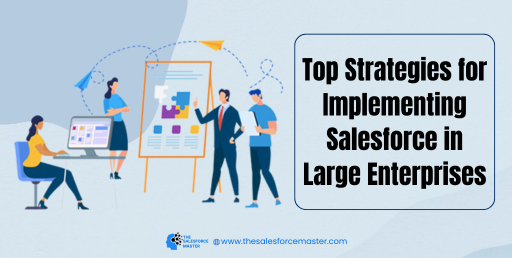
Top Strategies for Implementing Salesforce in Large Enterprises
Implementing Salesforce in a large enterprise can be challenging but highly rewarding. The platform offers robust tools that streamline operations, enhance customer engagement, and provide data-driven insights. Here are the top strategies to effectively implement Salesforce, ensuring a smooth transition and maximizing its benefits.
1. Define Clear Objectives and Plan Strategically
To begin with, establishing clear objectives is crucial for successful Salesforce implementation. Define what you aim to achieve, such as improving customer service, enhancing sales processes, or optimizing marketing campaigns. Developing a strategic plan that outlines the phases of implementation, including Salesforce login procedures, data migration, and training schedules, is essential. This approach ensures that the implementation aligns with the company’s goals, minimizes disruptions, and fosters user adoption.
Additionally, involve key stakeholders early in the process. Engaging them will not only provide valuable insights but also build support across departments. Use Salesforce’s capabilities, like Salesforce Marketing Cloud, to enhance customer communication and engagement. A strategic, phased approach will help to manage expectations and allocate resources effectively.

2. Ensure Data Quality and Optimize Integration
Large enterprises often have vast amounts of data, which makes data quality critical during Salesforce implementation. Start by auditing existing data to identify inaccuracies, duplicates, and gaps. Implement data cleansing and validation techniques to ensure data accuracy, consistency, and completeness. Use Salesforce Data Loader or native integration tools to migrate data efficiently. Moreover, establishing a data governance framework can help maintain data quality over time.
Optimizing integration with other enterprise systems, such as ERP and CRM tools, is also important. Leverage Salesforce’s API capabilities to create custom integrations, ensuring seamless data flow across platforms. This strategy helps avoid data silos and enhances the overall functionality of Salesforce. Utilizing tools like MuleSoft or the Salesforce Integration Cloud can make integration easier and more effective, enabling a holistic view of customer data.
3. Prioritize User Training and Change Management
User training and change management are vital for Salesforce’s success in large enterprises. Begin by creating a comprehensive training plan that covers Salesforce login processes, navigating the dashboard, and using key features like Salesforce Marketing Cloud. Offer training sessions tailored to different user roles, such as sales, marketing, and customer service teams. Providing on-demand resources, such as video tutorials and user guides, can reinforce learning and encourage platform adoption.

Furthermore, establish a change management plan to address resistance and foster a positive culture around the new system. Regularly communicate the benefits of Salesforce to the users and provide continuous support. A change management plan should include feedback loops, enabling users to share their experiences and suggestions. This feedback can help in refining the implementation process and ensuring that the platform meets user needs effectively.
Maximize Salesforce’s Potential with Continuous Evaluation
Finally, continuously evaluate Salesforce’s performance and user adoption rates. Utilize analytics tools, such as Salesforce Einstein, to monitor key performance indicators (KPIs). Regular assessments will help identify areas for improvement, such as feature enhancements or additional training needs. Keep up with Salesforce’s updates and releases to ensure your enterprise leverages the latest functionalities.
Salesforce implementation in large enterprises can be complex, but it can transform operations and drive business growth with the right strategies. Focus on clear objectives, data quality, user engagement, and continuous improvement to unlock Salesforce’s full potential.
Explore Our Latest Articles:
Salesforce Login | Salesforce Admin | Salesforce Marketer | Free Salesforce Certification Coupons | Salesforce Interview Exam Questions


